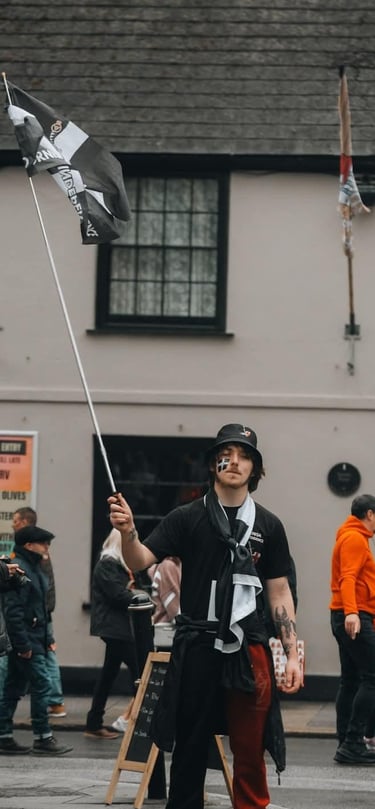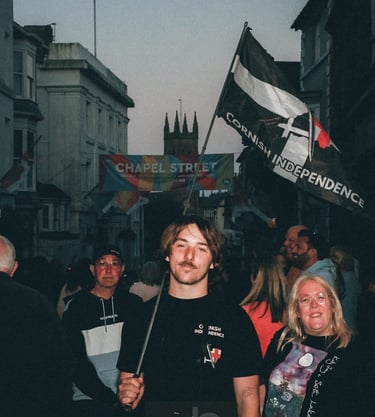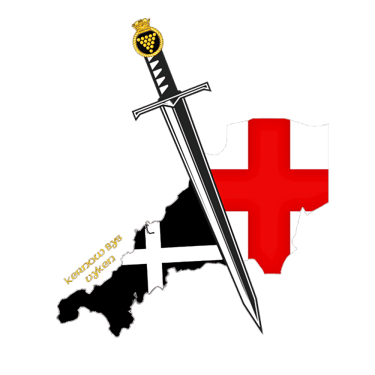WHY WAS THIS STARTED?
My name is Piran, and I'm a Cornishman, born and raised in Penzance, where I’ve lived in the same house my entire childhood. Cornwall’s rich history and Celtic heritage have always been close to my heart, and I have heard stories passed down from family members that always caught my attention. However, it wasn’t until a personal experience in the workplace that I realized how deeply the current system fails the people of Cornwall.
The turning point came when my hours were cut the day after the summer holidays ended. The tourists had gone home, and with them, the majority of customers the business relied upon. Suddenly, I had time to reflect on the fragility of Cornwall’s economy, which leans heavily on seasonal tourism. It became clear to me that this wasn’t sustainable, not for businesses, not for workers, and not for our communities.
As I delved deeper with my new free time, I learned about Cornish devolution and the incredible potential it holds. With the power to control our own future, we could diversify our economy, develop sustainable, year-round tourism growing on the £2.5B market, so Cornish employees in this business aren't tossed aside when the summer is over, and avoid the yearly cycle of job insecurity. We could unlock Cornwall’s lithium mining potential, an industry estimated to be worth over £300M a year, and with a global demand set to increase 500% by 2030, this industry could be capable of employing thousands of Cornish people in high income jobs. We could set fair limits and taxes on second homes and holiday lets, ensuring that the wealth generated here stays here and doesn't flow up country like a lot of it does today from companies who use Cornwall as a money scheme and don't care about the people.
I found this movement goes beyond our economy though. It could enable us to be able to preserve our culture, language, and communities. Only around 550 people claim fluency in Cornish in a county with around 550,000, with devolution we could invest in teaching schools and clubs Cornish and incorporate it further into local signage. It could make homes affordable for Cornish people through affordable housing schemes, as Cornish workers earn under national average, and houses in Cornwall are above the national average, and make second home owners pay their fair share to ensure they don't outprice Cornish citizens, and ensure that our villages and towns remain vibrant with local life, not hollowed out by holiday lets which leave whole villages empty out of the summer, with some Cornish villages having over 80% second homes at the moment. Achieving devolution would allow us to stabilize and further diversify our economy while protecting and strengthening our heritage as a Celtic nation, more similar to Wales, Scotland and Ireland than to England.
I found that once we’ve achieved devolution, a process already underway in parliament, it would be right to advocate for Cornish independence from England, whilst staying in the UK, to reflect our national minority status and national minority language status recognised by the UK and EU governments (basically recognising we are a nation within a nation) and forever solidify our identity to the world. If the average English person doesn't recognise our separate identity to them, then how is the world? Independence would ensure Cornwall’s unique culture and language are protected for future generations and guarantee that Cornwall is recognised as a nation in its own right; and this is why I decided to backup and spread this ancient movement.
The Origins of the Cornish Independence Movement
I am not the first to have this idea, the movement for Cornish devolution and independence has been around for centuries.
The Cornish independence movement has deep roots, stretching back to centuries of struggle for recognition and autonomy. From the rebellions against English oppressive rule in the 15th and 16th centuries to the establishment of the Cornish Stannary Parliament, Cornwall has long fought to protect its unique identity and rights.
In the modern era, movements for Cornish devolution gained traction in the 20th century, with the creation of the Mebyon Kernow political party in 1951 advocating for devolution, and with campaigns for a Cornish Assembly and recognition of Cornwall as a distinct Celtic nation. The movement has grown alongside efforts to revive the Cornish language and celebrate our heritage.
Today, the call for Cornish devolution and independence is stronger than ever. This movement is not just about the past; it’s about creating a future where Cornwall can truly flourish, and be able to contribute more to the UK as a whole.
What Happens Now?
It is my goal to further educate the people of Cornwall about the full picture of devolution and independence and the benefits and possible drawbacks it may hold, as well as make them more aware and proud of their ancient history as a Celtic nation. By reaching as many Cornish people I can through this website and social media, we strengthen our voice, and increase the chance of this eventual dream becoming a near reality. I have many plans for 2025, and by the end of the year I hope our voices will be loud, with significant progress towards a consensus for devolution and eventual independence, that will be undeniable to Westminster one day and make them call a referendum amongst the Cornish people, and with our team of 6 proud Cornish MP's pushing for devolution at the moment, we are making good ground to achieving our goals. If you would like to help this movement, please sign and share the petition as well as my posts mainly on instagram, and one day, we will achieve our long awaited dream that our ancestors fought and died for.






